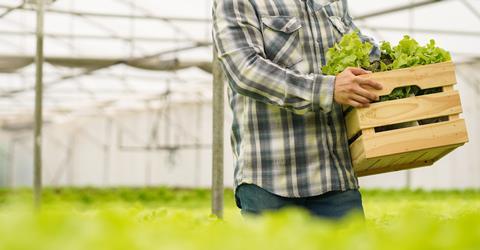Farmers’ union wants support to boost the nation’s health, climate resilience and economic growth

The NFU is highlighting the importance of upholding and increasing the nation’s self-sufficiency levels to help bolster food security.
With food security critical to national infrastructure and global instability putting pressure on food systems, the UK farmers’ union is looking to work with the new government to boost domestic food production.
It says this will boost the nation’s health, climate resilience and economic growth.
Dubbed ‘Self-sufficiency Day’, 14 August is the date this year that the national larder would run empty if consumers only ate food produced in the UK from 1 January.
Pressure on fresh produce supply
According to 2023 Defra figures, the UK is 62 per cent self-sufficient in food. While this reflects similar levels of the past decade, some sectors have seen a recent decline.
For example, the UK’s self-sufficiency in fresh vegetables – key in supporting the health of the nation – is at its lowest since records began in 1988 at 53 per cent.
This year, farmers and growers have experienced one of the wettest winters and springs on record, which has put pressure on food production causing a dramatic decline in the area planted of cereals for the 2024 harvest.
Additionally, record-breaking global temperatures have impacted key exporting countries across the world. For example, imports make up 84 per cent of fresh tomatoes on sale in the UK.
However, tomato imports from Spain and Morocco fell by 17 per cent in February 2023 compared to the five-year average.
Imports of lettuce varieties also fell by more than 36 per cent, contributing to shortages on supermarket shelves as UK production also declined.
‘Right policy framework’ needed
NFU president Tom Bradshaw said: “We welcome the government’s recognition that food security is critical to national security. Food from other countries will always form a proportion of our daily diets, but we must recognise the vulnerability of global food supply chains and the importance of a stable food supply here at home to our nation’s health, as well as its vital contribution to our economy.
“Farmers produce the raw ingredients that underpin our food and drink sector, the largest manufacturing sector in the UK, worth £146 billion and employing more than four million people. That is why investment in Britain’s farming sector is so important, so where we can increase self-sufficiency in homegrown foods, we do.”
Bradshaw explained: “If we are to maintain, and where possible grow, our self-sufficiency in the face of global instability, food-producing businesses need the right policy framework and investment to boost confidence and resilience so we can withstand climate and economic shocks.”



